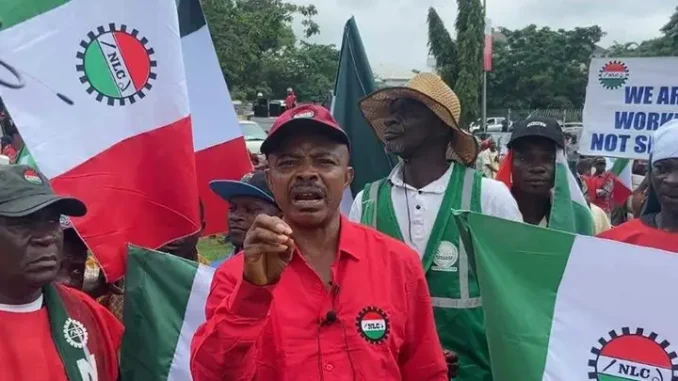
By Marvelous Nyang
June 10, 2024
Nigeria’s Organised Labour has categorically rejected the proposed ₦62,000 and ₦100,000 minimum wages, labelling them as “starvation wages.”
Instead, Labour is demanding a ₦250,000 minimum wage for Nigerian workers, as stated in the latest meeting of the Tripartite Committee on Minimum Wage on Friday.
Labour’s position unwavering
“Our position is very clear,” asserted Chris Onyeka, Assistant General Secretary of the Nigeria Labour Congress (NLC), during an appearance on Channels Television’s “The Morning Brief” on Monday, June 10, 2024.
Onyeka emphasised that Labour will not accept the government’s latest offer of ₦62,000, nor the ₦100,000 proposed by certain individuals and economists.
“We have never considered accepting ₦62,000 or any other wage that we know is below what we know is able to take Nigerian workers home. We will not negotiate a starvation wage,” Onyeka stated firmly.
He added, “We have never contemplated ₦100,000 let alone ₦62,000. We are still at ₦250,000. That is where we are, and that is what we considered enough concession to the government and the other social partners in this particular situation.
“We are not just driven by frivolities but the realities of the marketplace; realities of things we buy every day: bag of rice, yam, garri, and all of that.”
Deadline approaches
Onyeka highlighted that the one-week grace period given to the Federal Government last Tuesday, 4th June 2024, will expire at midnight on Tuesday, 11th June 2024.
He warned that if the Federal Government and National Assembly fail to act on the workers’ demands by the deadline, the NLC and the Trade Union Congress (TUC) will reconvene to decide on resuming the nationwide industrial action that was paused last week.
“The Federal Government and the National Assembly have the call now. It is not our call. Our demand is there for them to look at and send an Executive Bill to the National Assembly.
“If after tomorrow we have not seen any tangible response from the government, the organs of the Organised Labour will meet to decide on what next,” Onyeka warned.
Previous strikes and stalemates
After weeks of unsuccessful negotiations on a new minimum wage, Labour declared an indefinite strike on Monday, 3rd June 2024.
ALSO READ: Nigeria’s Labour unions suspend strike amidst minimum wage negotiations
The strike severely impacted businesses, including airports, hospitals, the national grid, banks, and legislative complexes.
The current minimum wage of ₦30,000, according to Labour, is insufficient to support the average Nigerian worker, especially in light of current inflationary pressures and the recent economic policies, including petrol subsidy removal and forex unification.
Labour also pointed out that not all governors have been paying the current wage, which expired in April 2024, five years after the Minimum Wage Act of 2019 was enacted by former President Muhammadu Buhari.
The act mandates a review every five years to align with economic demands.
Government’s response and continuing negotiations
In January 2024, President Bola Tinubu inaugurated a tripartite committee to negotiate a new minimum wage.
Labour initially demanded ₦615,000 but later reduced it to ₦497,000 and then to ₦494,000.
The government and the Organised Private Sector initially proposed wages ranging from ₦48,000 to ₦60,000, all of which were rejected by Labour.
Following the strike, Secretary to the Government of the Federation (SGF) George Akume conveyed the President’s commitment to a wage above ₦60,000 and announced that the government side of the tripartite committee would engage in a one-week negotiation with Labour to reach an agreement.
Labour’s concessions and government’s counteroffer
In a bid to reach a compromise, Labour further reduced its demand from ₦494,000 to ₦250,000.
However, the government’s response was to increase its offer by only ₦2,000, bringing it to ₦62,000, which Labour promptly rejected.
Both parties submitted their respective reports to the President, who is expected to make a final decision and send an executive bill to the National Assembly to pass a new minimum wage law.
Awaiting presidential action
The decision now rests with President Bola Tinubu. Labour has made it clear that they expect the President to send an executive bill to the National Assembly that aligns with their demand for a ₦250,000 minimum wage.
If the bill does not meet their demands, Labour has indicated that they will resume their industrial action.
Potential consequences
Should the Federal Government fail to address the workers’ demands satisfactorily, the nation could see a resurgence of the industrial action that previously disrupted key sectors.
Labour’s firm stance reflects the urgent need for a wage that aligns with the economic realities faced by Nigerian workers, ensuring their ability to maintain a reasonable standard of living amidst rising costs and inflation.
Conclusion
The coming days are critical as the Federal Government and National Assembly deliberate on the proposed minimum wage.
Labour’s position remains steadfast, with the potential for renewed industrial action looming if their demands are not met.
The resolution of this issue will significantly impact the livelihoods of millions of Nigerian workers and the broader economic stability of the country.

